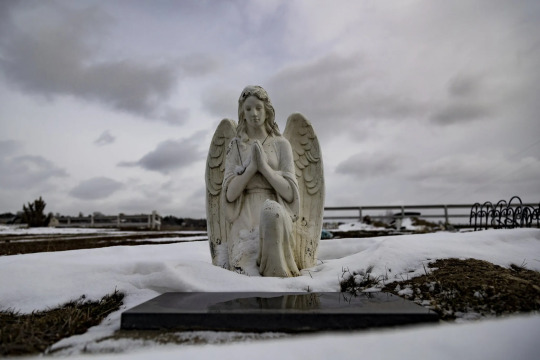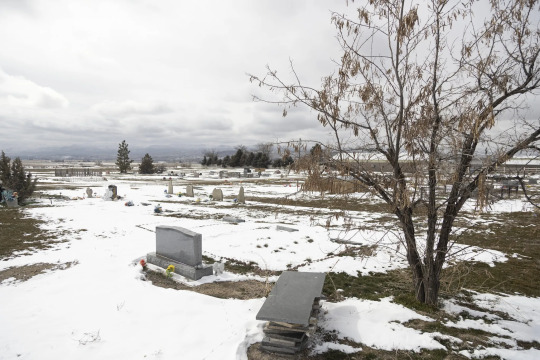#religious exemption
Link
By: Wilson Criscione
Published: Mar 13, 2022

[ Graves of children are scattered throughout Peaceful Valley Cemetery outside of Boise. The cemetery is used by Followers of Christ, a sect of Christians who reject medicine and instead rely on prayer to heal the sick. ]
For years, Linda Martin has kept a stack of files describing the deaths of children in Idaho.
Each death is a child of the Followers of Christ, a sect of Christians who reject medicine and instead rely on prayer to heal the sick. Martin was raised in the church but now is among the strongest advocates of making faith healing in lieu of necessary medical care illegal in Idaho.
But each year, Martin’s stack of coroner reports keeps growing.
“These never get any easier to read,” she says.
There’s a 2-year-old whose feet swelled as a fever burned for six weeks before she died of strep pneumonia. There’s a baby who died in its mother’s arms due to a disease in the colon that could have been treated with surgery. There’s stillbirth after stillbirth after stillbirth, reports obtained by InvestigateWest show. And because of Idaho’s religious exemption for so-called “faith healers,” all of it is perfectly legal.
Many states, including Washington, have some kind of legal protections for parents who refuse medical treatment for religious reasons. But due to Idaho’s extraordinary leniency for faith-healing parents and the number of deaths at Followers of Christ, Idaho’s has drawn the most attention, including a 2018 Emmy-nominated documentary called “No Greater Law.” It’s one of only a handful of states that shields faith-healing parents from felony charges such as manslaughter even if their children die of treatable illnesses.
Attempts to remove the faith-healing exemption have been blocked repeatedly by Idaho legislators trumpeting religious freedom and parental rights. And while the pandemic has pushed public health into the headlines, it’s done little to take politics out of the discussion. In many ways — especially when it comes to parents’ decisions for their children — it seems to have had the opposite effect.
Far from trying to remove Idaho’s faith-healing exemption, Idaho lawmakers introduced a bill in November that would have strengthened it, though it stalled in the Senate.

[ Attempts to remove Idaho’s faith-healing exemption have been blocked repeatedly by Idaho legislators trumpeting religious freedom of groups like the Followers of Christ. ]
Even in Washington, proponents of removing the state’s religious exemption for abuse or neglect — which, somewhat uniquely, only applies to Christian Scientists — are finding the task more difficult than they’d anticipated. In the last decade, several attempts to do so have failed.
A new Washington proposal, House Bill 1048, had some advocates optimistic until the legislation stalled in the Senate in late February. Lawmakers who supported it had been skeptical it would get through, given how the pandemic has stoked concerns over parental rights and medical decisions.
“I view that as an obstacle, not a tail wind,” says Sen. Mark Mullet, D-Issaquah, who spon.sored a similar bill two years ago. “You can’t do public policy in a logical way when things are super emotional.”
Stalled in Olympia
Rita Swan, who founded an organization working to repeal faith-healing exemptions across the country, says that Idaho’s exemption is particularly egregious, but Washington’s is problematic, too.
Washington first added a Christian Science exemption for medical neglect as part of an education bill in 1969. Then in 1997, the state expanded the exemption so that parents using Christian Science treatments can’t be criminally prosecuted for withholding medical care. That change was part of an amended bill adopted pro forma, meaning it was voted on with no opportunity to make changes.
Today, Washington is one of three states — the other two being Arizona and Connecticut — to have exemptions mentioning Christian Science directly. Children or vulnerable adults receiving Christian Science treatment are not considered abused or neglected in Washington, even if it leads to a high probability of death.
Proponents of the exemption argue that it allows Christian Scientists to treat children according to their religious beliefs, claiming there have been thousands of healings due to Christian Science prayer treatments. The Christian Science church says members are not forbidden to go to doctors.
But with the way the law is written, Swan says, it’s possible to claim a religious defense to a second-degree murder charge when a child dies of abuse or neglect.
“I think it’s so foreign to Washington’s values,” Swan says.
Swan is a former Christian Scientist herself. In 1977, she was living in Michigan when her 16-month-old son, Matthew, became ill with a fever. She called a Christian Science practitioner for treatment, which amounted to praying for the child.
When the fever wouldn’t go away, Swan wanted to take him to the doctor. But she was torn: If she sought medical care, the Christian Science practitioner said she’d no longer give Matthew prayer treatments. To the church, Swan’s doubts about the prayer treatment were the reason they weren’t working.
On the 12th day of Matthew’s fever, Swan took him to the hospital.
“Immediately six nurses surrounded him,” Sway says. “I thought, ‘These are the people that care about children.’”
But it was too late. Within days, Matthew died of meningitis.
Swan, ridden with guilt, left Christian Science and devoted her life to removing exemptions allowing faith healing in lieu of medical care. She began tracking related deaths in each state. So far, she’s identified 10 children since the 1970s who’ve died in Washington from treatable diseases, and nearly 200 in Idaho.
In Washington, bills to change the exemption in the last decade have failed to gain traction. Oregon, meanwhile, ended its religious defense for faith healers in 2011 for cases of homicide and criminal mistreatment of children. Since then, several Followers of Christ parents in Oregon have been convicted of not seeking medical care for their children.

[ The Peaceful Valley Cemetery outside of Boise is used by Followers of Christ, a sect of Christians who reject medicine and instead rely on prayer to heal the sick. ]
Mullet, the Washington state senator, grew frustrated that multiple bills he spon.sored to remove the exemption never passed. At first, he could blame the Republican-controlled Senate, but once Democrats gained control several years ago, the bills still didn’t pass.
“At the end of the day, they were like, ‘This isn’t a top priority that we have to pass this session so it can wait until next year.’ And that was just the story over and over,” Mullet says.
This year, Rep. Emily Wicks, D-Everett, spon.sored a bill that would have removed the reference to Christian Science practitioners in the state’s criminal mistreatment law and clarified that faith-based practices constitute negligent treatment or maltreatment if they pose a clear and present danger to the child.
The Christian Science church in Washington took a neutral stance, but said they’re generally supportive of the change.
“We recognize the responsibility and ethic that must especially extend to the care of children and vulnerable adults who depend upon others for their proper care,” says spokesperson Lance Matteson. “We feel this bill achieves that proper balancing of interests that promotes health and fairness for all Washingtonians, including our most vulnerable.”
The bill overwhelmingly passed through the House on Feb. 14 with bipartisan support. But again, it died in the Senate at the end of the month.
Caroline Fraser, an author who was raised a Christian Scientist in Washington, supported the law change but says the root of the problem goes deeper than the current state law. If the Christian Science exemption were removed, Fraser remains skeptical the law would be followed. Christian Scientists may not see that a child has a disease, she says, because their “entire life is based on denying the existence of those diseases.”
“If you’re a believer, you cannot evaluate whether a child is suffering,” Fraser says. “They won’t report because they don’t believe what’s in front of their eyes.”
‘These kids were dying’
As her stack of death reports continued to grow, Martin turned her attention in 2017 to the coroner in Idaho’s Canyon County, where gravestone after gravestone marks the deaths of young Followers of Christ children in the church-affiliated Peaceful Valley Cemetery near Boise.

[ The Peaceful Valley Cemetery is located about 30 miles outside of Boise and is used by Followers of Christ, a sect of Christians who reject medicine. ]
She filed a complaint with state Attorney General Lawrence Wasden, alleging that the coroner at the time repeatedly failed to refer children’s deaths to law enforcement as required by state law. Martin provided more than a dozen coroner reports backing up the allegation.
But the attorney general’s office declined to look into the complaint at all. Instead, in the office’s response to Martin obtained by InvestigateWest, they quibbled with the language of the law. The law requires a referral to law enforcement if a death occurs that is not attended by a physician “and the cause of death cannot be certified by a physician.”
While the deaths in Martin’s complaint were clearly not attended by a physician, the attorney general’s office said Martin’s complaint failed to allege that they could not have been certified by one.
For that reason, the attorney general’s office said the complaint didn’t establish even “potential” violations of the law, so they did not have authority to investigate. The office declined to comment for this article.
Martin calls it a “phony excuse” that illustrates how committed Idaho remains to protecting Followers of Christ, a small church with members scattered around the state and in Oregon.
“I really thought people would care more. You think that when you put so much out there, and with the horrific way these kids were dying, that people would care enough to help,” Martin says.
Idaho’s religious exemption dates back to 1972. Soon after, religious exemptions for medical neglect became much more common. In 1974, Richard Nixon signed the Child Abuse Prevention and Treatment Act, which carved out a faith-healing exemption and required states to pass similar exemptions in order to access federal funds.
That federal requirement was later rolled back, and many states subsequently repealed religious exemptions.
In the last decade, Martin has tried everything she could to remove Idaho’s exemption. She told them about her nephew Steven who died of untreated pneumonia just before he turned 3 because Martin’s brother was a member of Followers of Christ and refused to get him medical care, Martin says. She showed reporters graves of children scattered throughout Peaceful Valley Cemetery.
In 2015, a task force put together by then-Gov. Butch Otter estimated that 31 percent of the gravestones at the Peaceful Valley cemetery belonged to children, 10 times higher than child deaths in the rest of the state.

[ In 2015, a task force compared the child deaths in Idaho overall with the gravestones at Peaceful Valley Cemetery. The task force estimated that 31 percent of the gravestones at the cemetery belonged to children, 10 times higher than child deaths in the rest of the state. ]
But bills to change the law were scuttled. State Sen. Patti Anne Lodge emerged as a major obstacle for child advocates, arguing — like many Idaho lawmakers — that faith healers have a right to practice their religion, even when there are deadly consequences.
Lodge, who lives in Canyon County, is not a member of Followers of Christ but has spoken openly in favor of the church. Its most publicly seen member, Dan Sevy, who featured heavily in the “No Greater Law” documentary, reportedly played music for one of Lodge’s fundraisers in 2016. Sevy declined to comment for this article. In the past, he’s argued to state legislators that Western medicine comes from “Satan” and that the reason more Followers of Christ children die is because the members have larger families.
In January, child advocates and law enforcement officials held a panel again calling for a change to the faith-healing exemption, but no legislation was introduced. One advocate, Protect Idaho Kids founder Bruce Wingate, says if a bill overturning Idaho’s exemption didn’t pass before, it certainly would have a hard time passing in 2022.
The pandemic has only amplified fears from Idaho’s conservatives that their religious freedom and parental rights are under attack.
“But with or without a pandemic, parental rights don’t trump a right to life,” Wingate says. “These kids don’t know what constitutional freedom or religious freedom is. They’re 1 or 2 years old.”
==
Faith-healing exemptions need to end.
#christianity#faith healing#victims of faith healing#victims of religion#Followers of Christ#child abuse#faith healing victims#religious exemption#prayer#praying#prayers#pray#prayers are useless#prayer is useless#prayer is worthless#medicine#medicine vs faith#faith vs medicine#faith#faith is not a virtue#anoint with oil#anoint with oils#anointing#religion#religion is a mental illness
15 notes
·
View notes
Text
just a reminder: the organisation called The Satanic Temple is a scam and giving them your money will not protect your reproductive rights
#roe v wade#roe versus wade#roe v. wade#tst#the satanic temple#lucien greaves#douglas mesner#reproductive rights#reproductive justice#abortion#religious exemption#ILU486 in real life#every part of you belongs to you#please reblog this#people need to know this#don't give TST your money
20 notes
·
View notes
Text
Religious exemptions to unemployment taxes in 2024
Last week, the Wisconsin Supreme Court issued its decision in Catholic Charities v. LIRC, 2024 WI 13. At issue in this case was whether the Catholic Charities entities would be exempt from paying any unemployment taxes (and their employees no longer eligible for unemployment benefits when laid off) because the Catholic Charities entities are, like churches themselves, operated for faith-based…

View On WordPress
0 notes
Text

✨Can I Offer You An Akademiya Romance In These Trying Times✨
#haino#cytham#me clawing at the doors to hyv hc once again: release the temple of silence lore from the vault#spantamad lisa and her scary junior cyno canon#let me let u guys in on my favorite hc#the temple of silence only exists in dreams#cyno has academic dispensation from the akademiya not to wear an akasha terminal while hes sleeping#religious exemption to dress in hermanubis priestly garb and conduct unnamed acts of worship to king deshret#hes descended from the priest kasala but the headpiece is custom commissioned because the specs came to him in a dream#made a deal with the akademiya to cooperate with the historians so that the ancients rituals from that time could be studied and preserved#okay delulu hours over#hyv i will do i want until you feed us the real lore!!
2K notes
·
View notes
Text
So I mentioned this on the discord, but I was looking up possible inspirations for the name SUMMUM as a name for a decorp group (apparently it was actually a backer suggestion that was also the name of a server for a while? Anyway,) and one of the first results I came across was this wikipedia page for a... religion? Cult? Tax evasion scheme? (admittedly those things have a fair bit of overlap) that was led by a guy who went by the name, and this is not a joke, "Summum Bonum Amon Ra".
I just absolutely lost it imagining some dude who's, like, really into decorp, but it's Okay Actually, Because I'm Actually RA. Like, some guy who either claims to be some manifestation of RA or will eventually join with RA, which is why he needs to - and is perfectly okay to - break the First Contact Accords. I doubt this is what the backer who came up with the name ever possibly intended, but it's pretty funny.
#Lancer RPG#Incidentally the guy was mummified following his death#The mummification is apparently how they got a religious exemption for tax reasons#They also apparently measure their number of members in how many bottles of wine they gave out#I think if I was to ever use SUMMUM in a campaign I'd look more towards philosophical influences for research#but this was a good chuckle
74 notes
·
View notes
Text





Willfully, aggressively ignorant antivaxxers will be the reason why The Walking Dead becomes non-fiction
#politics#republicans#antivaxxers#covidiots#childhood vaccines#preventable diseases#preventable illnesses#religious exemptions#bullshit exemptions#childhood vaccinations
77 notes
·
View notes
Text
Revs. Jan Barnes and Krista Taves have logged hundreds of hours standing outside abortion clinics across Missouri and Illinois, going back to the mid-1980s. But unlike other clergy members around the country, they never pleaded with patients to turn back.
The sight of the two women in clerical collars holding up messages of love and support for people terminating a pregnancy “so infuriated the anti-abortion protesters that they would heap abuse on us and it drew the abuse away from the women,” recalled Taves, a minister at Eliot Unitarian Chapel in Kirkwood, Missouri, as she sat on a couch at Barnes’ stately church in this quiet suburb of St. Louis.
“I thought: ‘Whoa, these people really are not messing around.’ But then I thought, ‘Well, I’m not messing around either.’”
So when Missouri’s abortion ban took effect after the Supreme Court overturned Roe v. Wade last year, Barnes and Taves decided to fight back. Along with rabbis and ministers across several denominations, they joined a first-of-its-kind lawsuit arguing Missouri blurred the line between church and state, imposed a particular Christian idea of when life begins over the beliefs of other denominations, and threatened their ability to practice their religions.
As the nation nears the one year anniversary of the fall of Roe, the Missouri case is one of nearly a dozen challenges to abortion restrictions filed by clergy members and practitioners of everything from Judaism to Satanism that are now making their way through state and federal courts — a strategy that aims to restore access to the procedure and chip away at the assumption that all religious people oppose abortion.
In fact, many of the lawsuits are wielding religious protection laws enacted by anti-abortion state officials to target those officials’ own restrictions on the procedure.
In Indiana, a group of Jewish, Muslim and other religious plaintiffs sued over the state’s near-total abortion ban. Their argument: that it violates the Religious Freedom Restoration Act signed into law in 2015 by then-Gov. Mike Pence. A lower court judge sided with them in December and blocked the state’s ban from taking effect — the most significant win the religious challengers have notched so far.
Then, earlier this month, the Indiana judge granted the challengers class action status, meaning a win for them could apply to anyone in the state whose religion supports abortion access in cases prohibited by state law.
“Even if the Religious Freedom law was intended by Mike Pence to discriminate against people, we thought: ‘Let’s use this for good instead,’” said Amalia Shifriss, a leader of Hoosier Jews for Choice, one of the Indiana plaintiffs. “It brings me joy to think how much this must upset him.”
A Pence spokesperson characterized the lawsuit as a “pursuit to legalize abortion up to and even after birth.” They added: “It will probably strike Americans as pretty tasteless to call the latest iteration of their abortion crusade as a cause ‘for good’ and a source of ‘joy.’”
Conservatives with a history of mounting their own religious challenges to state laws dismiss the effort as doomed to fail, arguing that even if people can prove the abortion bans violate their beliefs, it won’t be enough to halt enforcement.
“As Justice Ruth Bader Ginsburg explained in one Free Exercise case, the right to swing your arm ends just where the other man’s nose begins,” said Denise Harle, senior counsel with Alliance Defending Freedom, a conservative legal group that has filed briefs defending state abortion restrictions, including from faith-based challenges in Wyoming and Florida. “Even if you have religious freedom, there is a line at which you are doing actual deadly harm and destroying human life, so it’s appropriate to limit what can be done in the name of religion.”
But with oral arguments and rulings in several of the cases expected this summer and fall, other legal experts say there’s a solid chance the challengers can persuade courts to grant religious exemptions to abortion bans if not strike them down altogether.
Shlomo C. Pill, a lecturer at the Emory University School of Law who specializes in religious rights, said the lawsuits have “a strong basis and should be successful,” particularly after a series of COVID-19-related cases paved the way for more religious exemptions. Pill pointed to multiple Supreme Court decisions during the pandemic that said whenever states create secular exemptions to laws — like indoor gathering restrictions or vaccine mandates — they have to justify not offering religious exemptions as well.
“So the fact that secularly-motivated exemptions to abortion bans exist — such as for rape and incest — means the legislature could also have to offer similar exemptions for people with religious objections,” he said.
‘REAL CHUTZPA’
Most of the cases, including those in Indiana, Kentucky, and Texas, are demanding exemptions from the bans for people whose religions support abortion rights. But a few, including the lawsuits in Florida, Missouri and Wyoming, are attempting to have the bans struck down entirely.
In Missouri, the plaintiffs argue that because lawmakers put religious language in the text of the abortion ban itself and made explicit religious appeals when voting on it, they violated the Establishment Clause.
“It took real chutzpah for the legislators to voice their own religious motivations, to wantonly and shamelessly purport to know what God wants or doesn’t want and to enshrine that into law,” said Rabbi James Bennett of Congregation Shaare Emeth in St. Louis, another plaintiff in the Missouri lawsuit. “They’re entitled to their interpretation of when life begins, but they’re not entitled to have the exclusive one.”
Last week, the group faced off in a St. Louis courtroom with state officials who are pushing to have the case thrown out. A ruling could come as soon as this summer.
In Florida, clergy representing Reform Judaism, Buddhism, the Episcopal Church, the United Church of Christ and the Unitarian Universalist Church sued in state court both to overturn the state’s 15-week abortion ban, and — if that fails — to secure religious exemptions. Their case makes free speech arguments as well — claiming that state bans on “aiding and abetting” abortions are muzzling clergy members who want to offer counseling to parishioners grappling with whether to terminate a pregnancy.
In Kentucky, three Jewish women are arguing that the state’s near-total abortion ban violates their belief that life only begins when a baby takes its first breath, saying it’s preventing them from pursuing pregnancy through in-vitro fertilization.
“To have someone else’s religious belief that an embryo is a human being imposed on me in a way that’s so personal, that prevents me from growing my family, is just rude and un-American,” Lisa Berlow, the lead plaintiff in that case, said in an interview. Berlow had one child through IVF and was planning to have another before Dobbs made her and her fellow plaintiffs fear prosecution. “Discarding non-viable embryos could now be criminalized, or I could miscarry and not know what type of medical care I would get or whether I would be investigated for causing the miscarriage,” she said.
The Satanic Temple is in federal court challenging abortion bans in Texas, Idaho and Indiana, arguing that the laws infringe upon their congregants’ belief in bodily autonomy and right to practice abortion as a religious ritual. A Texas District Court ruled against the Satanists last fall, saying they didn’t prove the need for a temporary restraining order blocking enforcement of the ban against its members. The 5th U.S. Circuit Court of Appeals is poised to rule on the challenge in the coming weeks.
These cases are unlikely to restore abortion rights at the federal level given the weaker religious rights protections in the U.S. Constitution compared to many state constitutions as well as the federal judiciary’s rightward tilt.
Elizabeth Reiner Platt, director of the Law, Rights, and Religion Project at Columbia Law School, stressed that the Supreme Court has a record of protecting the religious rights of some groups and not others, pointing to its back-to-back decisions in 2017 upholding the right of a Christian baker to refuse to bake a cake for a same-sex wedding and allowing the right of the Trump administration to deny entry to travelers from majority-Muslim countries.
“While I don’t like to read the tea leaves, I don’t have any hope that the current Supreme Court would, after ruling that there was no due process right or privacy right to abortion, would find a right under the Free Exercise Clause or the Establishment Clause,” Platt said.
Still, she and other legal experts see the state-level religious challenges as one of the best chances abortion-rights advocates have to chip away at bans on the procedure.
“The arguments are quite powerful for creating religious exemptions in the reproductive context under First Amendment doctrine and under state laws for Free Exercise,” said Micah Schwartzman, director of the Karsh Center for Law and Democracy at the University of Virginia Law School. “What Judges do with them is another story.”
In order to succeed, these lawsuits must prove: that the right to an abortion is central to the religious practices of the people suing; that they are sincere in their beliefs and have a track record of observing them; and that state abortion bans make it impossible for them to live according to their faith.
The cases challenging abortion restrictions in their entirety face an additional hurdle: proving that state officials stepped over the line separating church and state in crafting the bans.
“We have a really strong Establishment Clause argument because it’s clear that these bills were passed for religious reasons,” said Marci Hamilton, a professor of constitutional law at the University of Pennsylvania who is part of the legal team representing clergy in Florida. “The 15-week bill was signed in a church and members of the state legislature repeatedly referred to God when arguing why this had to be done.”
Other experts are skeptical, however, of the strength of these arguments.
“There are a million-and-one other explanations a state could give for their abortion restrictions,” Pill said. “They could argue it’s a matter of secular conscience, for example. And once you have any kind of secular justification, an Establishment Clause argument becomes more difficult.”
For their part, the states defending their abortion laws and the conservative legal groups supporting them have to prove that they have a compelling interest — unrelated to religion — in protecting fetal life, that they’re using the least restrictive means to protect that interest, and that the challengers’ claims are speculative and premature because none of them have actually sought an abortion or been blocked from obtaining one since the laws took effect.
“I think these are much more like political stunts than they are viable court cases,” said Lori Windham, a vice president and senior counsel at the Becket Fund, the legal firm behind the Hobby Lobby case that secured a Supreme Court ruling allowing many employers to opt out of covering certain forms of birth control for their workers due to a religious objection. “You can have a sincere political belief or policy preference, and it can be passionate and deeply held, but that doesn’t make it a religious practice.”
CITING SCRIPTURE
Judges have historically avoided questioning the sincerity of someone’s religious beliefs, but Becket and other groups have filed amicus briefs that do so.
To combat these accusations, the challengers point to scripture that lays out a case for abortion rights as well as support from religious leaders for their claims.
The Jewish challengers in Kentucky cite religious texts including the Mishnah that say life begins when a baby takes its first breath, not when it is conceived, and if medical issues arise during pregnancy, the pregnant person’s life “comes before the life of [the child].” They also submitted to the court letters from rabbis arguing that current state exemptions for life-threatening medical emergencies aren’t enough, saying Jewish law permits, and in some cases requires, an abortion when there is “a risk of poverty, abuse, addiction, or mental illness.”
The case challenging Missouri’s ban cites the United Church of Christ’s vote in 1971 to acknowledge the right to abortion and members’ “autonomy to determine what happens to their own bodies,” as well as the Episcopal Church’s “long-standing opposition” to any government attempt to infringe on reproductive choices.
“There’s a tendency to see these cases as kind of a clever, legal switcheroo. Like, here’s a way to take these laws that are often thought of as very conservative and use them to protect abortion rights,” Platt said. “But the idea of reproductive rights as a religious liberty issue is absolutely not something that came from lawyers. It’s how faith communities themselves have been talking about their approach to reproductive rights for literally decades.”
#us politics#news#politico#2023#abortions#abortion bans#reproductive rights#reproductive health#Missouri#Indiana#Religious Freedom Restoration Act#mike pence#Hoosier Jews for Choice#Alliance Defending Freedom#free exercise clause#religious exemptions#Kentucky#Texas#Florida#Wyoming#Establishment Clause#us constitution#in-vitro fertilization#Judaism#Episcopal Church#United Church of Christ#Unitarian Universalist Church#organized religion#religious freedom#the satanic temple
100 notes
·
View notes
Photo

In a major setback for the Biden administration’s vaccination mandate, a federal judge has ruled that military brass cannot punish any Marine who refuses to receive the COVID-19 vaccine for religious reasons.
“U.S. Marines who filed for religious exemption and were denied, at least at the first level, are now protected,” Mat Staver, the founder of @LibertyCounsel.
Link: https://www.washingtonstand.com/news/oorah-marines-win-major-victory-over-bidens-vaccine-mandate
#The Washington Stand#USMC#Covid-19#Biden Administration#vaccination mandate#Federal Court#religious exemptions#washingtonstand.com
373 notes
·
View notes
Text
RUBY FRANKE AND JODI HILDEBRANDT SENTENCED TO 4 TO 60 YEARS IN PRISON LETS GOOOOO
#Ruby pled guilty to the charges#She'll likely stay about 30 since that's the current limit legally in Utah for consecutive sentences#But that's only if she's sentenced to the maximum sentence possible#15 years for each case of child abuse#for a total of 4 cases and 60 years#her adult children aren't considered methinks#similar to how a therapist can't tell authorities you're being abused after u turn 18 without your consent#idk how much she'll get seeing as they're in Utah#so there's a lot of ppl that genuinely believe she has a right to do anything to her kids short of killing them#if it means they stick with the religion for as long as they live#some do believe killing ur kids should be allowed tho if it saves their soul or whatever#I disagree with both obviously I think you should be hit with hammers if you treat your kids anywhere near like this#but Jodi better get got those aren't even her fuckin kids got damn#I hope they both get the maximum sentence but especially Jodi cause she absolutely exhasterbated this paranoid mom's shit#Ruby isn't innocent in the slightest she was fucked before Jodi ever showed up#but I fully believe Jodi pushed her closer to this extremen#extreme*#and I hope we start to chip away at the religious exemptions we still have in the US when it comes to child abuse#'spare the rod' spare ur fucking breath if you hit a child I'm gonna hit you with hammers#ex christian#religious trauma#child abuse
9 notes
·
View notes
Text
HELL YEAH I SAW MY FIRST EVER ECLIPSE


YOOOOOOOOO
(I have solar glasses so I'm okay)
#just posting#I'm so excited cuz this is my first time seeing an eclipse at all!!!!#but also Muslims have a religious belief around this that you have to pray#Cuz it counts inside disasters#I don't have to pray ATM cuz I'm on my period which means I'm exempt
13 notes
·
View notes
Text
Been interviewing folks to take over my old position and I am SO glad that I've included being vaxxed as a term of employment. It makes it extremely easy to rule out a lot of people that would undoubtedly quickly become obnoxious to train and then work with.
#be vaxxed or gtfo#'oh I have a religious exemption' I grew up with religious exemption people and they can't work here either fuck offffff#the only person who hasn't had a problem with it was also of course the only obviously queer person#pretty sure I'm gonna hire her#just on a secret mission to make my office as gay as possible#life of faye
19 notes
·
View notes
Text
So we have a sign on our door saying 'no soliciting of products, services, or religion'. Sometimes, we get idiots banging on the door anyway.
Usually, I let this slide and just don't answer. Yesterday, after spending five hours dealing with my dogs barking at something and having that oh-so-cheery little knock set them off again...I was going to give whoever it was an earful.
However.
That notice is on the front door.
We don't use that door. We use the side door at the carport.
I didn't have to give them an earful, because they were so busy knocking on the wrong door that they didn't hear me come out the other door and come up behind them, and I was treated with the sight of two grown men jumping half a foot in the air.
That was my Scarecrow moment, and maybe it's mean, but it was funny.
#personal#look the sign is legible#if i'm not expecting you get off my lawn#there's a pentagram on it for god's sake#(before we put that sign there the religious ones would always think they were exempt)#(you are not go away)
7 notes
·
View notes
Text
Girl help they are making me remove wrinkles from female celebrities in Photoshop class.
#that's against my values. can i be religiously exempt#the professor did agree it's not necessary but if we work in a magazine they want everything to look perfect so they'll make us do it#reason 1821 i am never working for magazine covers or advertisement#stavro has a thought
7 notes
·
View notes
Text
pride tape ban will never not be confusing to me. every hockey fan ik either has lesbian reformed fujoshi energy or is some 50 year old dude who thinks he might have been bi in college. hell half the aac is bud light themed why the fuck did you think we were uppity about this 💀
#objectively silly move.#one of the people complaining about pride jerseys cited religious exemptions#MF YOU PLAY FOR THE DEVILS 😭😭😭#if you see a bud light mention in dallas texas and it get no mention no 20 kid rock tweets or whatever.#then you know yr audience is down for anything
8 notes
·
View notes
Text
ik i've gone on abt this A Lot recently but it genuinely is so exhausting to exist as a queer woman in sports fanbases but especially in football recently because i love the highs and lows of emotions i experience when watching my favourite teams and players but seeing ppl you look up to and admire for their work casually embrace generally shitty people but specifically shitty towards women hurts man, and that's not even to Begin taking about the casual sexism and general queerphobia so many fans display
#like sometimes i just want to give up and shut down this blog man#and it's not just about the recent stuff with utd yk first the greenwood business and now with antony#it's the wrestlers' protests in india back in april/may and the fact that the the govt continues to embrace and#support the accused. even if it comes at the cost of our players not being able to play under the indian flag at all#it's abt the fact that every aspect of indian sports is so overrun with religious nationalism its hard to take pride in india's achievement#when it just fills me with grief instead#and i know im not exempt from criticism because i myself like players and drivers etc that do the very same things im#talking abt and continue to like them and post abt them i just.#idk man. idk. im so tired.
6 notes
·
View notes
Text

"No, you see, I can't drink it because I'm---"
-> Pause for thought.
"... Allergic. Probably."
#* dash comm.#🌙 you're the first starlight reborn through the night ( main. )#please let me in to the fight arena now i claim religious exemption or whatever
7 notes
·
View notes